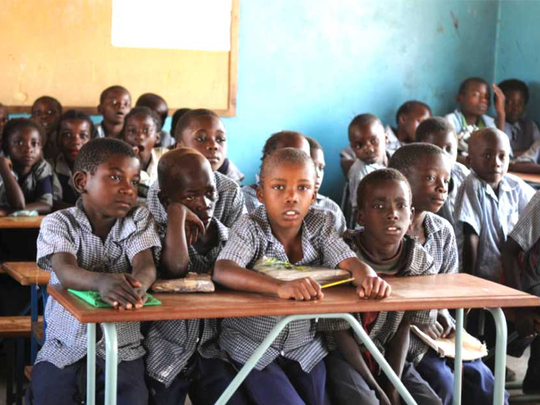
| Julia Gillard Former prime minister of Australia |
Just two weeks ago, we learned of yet another tragic abduction by Boko Haram of girls in northeastern Nigeria. A near replay of the 2014 mass kidnapping in Chibok that attracted global attention, the terror group this time reportedly kidnapped more than 100 girls at a boarding school in the town of Dapchi in Yobe state.
The continuing and extreme threat to girls who only want to go to school is a stark reminder of why we must observe International Women’s Day. In spite of the truly remarkable social, economic and political strides for women around the world over the last generation, we’re far from the goal of full gender equality.
One of the primary measures of that progress is how many girls globally get the education they deserve and need to live full, prosperous lives. It’s encouraging that the number of girls who are not in school at all has dropped by about 40 per cent since 2000. Yet there are still more than 130 million out-of-school girls globally. They will join the ranks of almost 500 million illiterate women across the globe, two-thirds of all illiterate adults. Without the ability to read, write and do basic math, most of these women will live in extreme poverty and hardship, unable to govern their own destinies or live out their full potential in life.
By kidnapping and essentially enslaving girls, Boko Haram is trying not only to deny them an education, but to own them as property and slaves. While most of today’s out-of-school and under-educated girls have not faced violations and depredations of such a magnitude, their right to education is also being denied, and they face significant challenges.
Too many girls still become “child brides” and mothers, or end up in wage-earning work at young ages to support their families, or are deemed unworthy of the schooling that boys get. And other barriers — such as unaffordable school fees, dangerous treks to school, threats of sexual abuse, inadequate menstruation facilities, humanitarian crises and lack of female teachers — keep them from school.
It’s a reality that Fatoumata Jallow-Tambajang, the vice-president of the Gambia, powerfully addressed in her remarks last month at the Global Partnership for Education’s (GPE) Financing Conference in Senegal. A child bride herself who married and had a child at 16, she later went on to receive a university degree in France and to work within and outside of government, often as a leading advocate of women’s rights. Noting that she was determined to send her four daughters and four sons to school, vice-president Jallow-Tambajang told conference participants that “educating a girl is educating a nation because the bedrock of a society is a woman.”
More than a decade and a half ago, countries around the world began to make a more concerted effort than ever to educate all the world’s children — especially girls, whose access to schooling in many places fell far behind that of boys. More and more developing countries enacted a wide range of long-term interventions aimed to ensure that all girls get a quality education. Wealthier donor countries in turn began to commit more resources to support these efforts, though the share of development aid for education has not always kept up with the level of support for other development sectors.
Thirty-eight million more girls were enrolled in school across GPE partner countries between 2002 and 2015. The sustainable development goals for education calls for a quality education for all children — especially girls — by 2030.
At our conference in Senegal, 53 developing countries committed to increase their own education financing to a total of $110 billion (Dh403.7 billion) between 2018 and 2020. Donor countries pledged $2.3 billion to the GPE fund. As a result, 26 partner countries have already received new funding allocations and much of this funding will support the education of girls. While financing is essential to reaching the global goal for education, no less critical is changing a persistent mindset in most societies that holds girls back.
We reaffirm our determination to replace the idea that it’s acceptable to own or control girls with the notion that we owe them the tools for intellectual development, public participation, and their ability to secure their future.
We will devote even more energy, smart thinking and resources to get there.
— Guardian News & Media Ltd
Julia Gillard is now chair of the board of the Global Partnership for Education.








